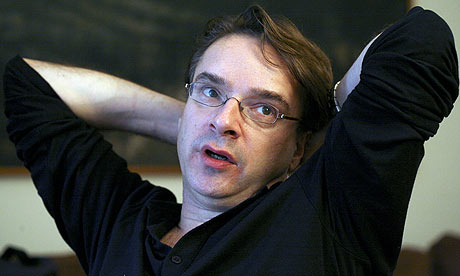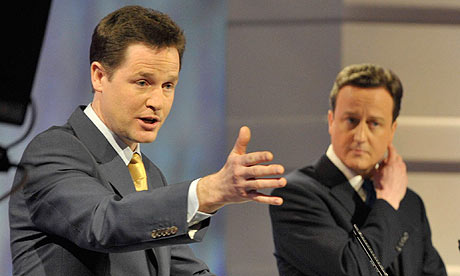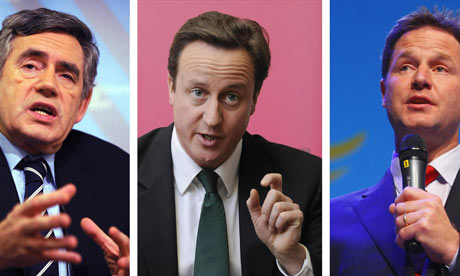
The debate was a curiously uninteresting affair. Actually, all three have been, with the exception of realising, in the first one, that there was a third contender. None of the candidates has bombed, even Gordon Brown has performed pretty well to expectations. They have all managed to say remarkably little, but finesse it as if they are giving us reams of detailed wisdom. They have rehearsed extraordinarily well and shown us that they can make ponderous statements, use the names of audience questioners, and help their policy defences along with a few homely anecdotes. They have neither made any serious gaffes (as ever, the campaign trail itself has provided the opportunity for that) nor shown any sparkling charisma. I watched last night's debate at the Tory Chairman's 'Watch Party' at Conservative HQ, which at least managed to give it a slightly pantomime atmosphere (Come on everyone, boo when Brown speaks, or jeer when Clegg does his 'there you go again' stunt; cheer David Cameron....), but even so, there were long stretches of boredom. It's come to something when you're looking forward to Eric Pickles' end of debate speech!
So we're through the television stuff and into the final week, and with the polls showing a remarkable consistency, we're either waiting for some game-changing event on the campaign trail next week, or face the excitement of a genuinely unpredictable, probably minority parliament. Anything to make the debates seem worthwhile.
The debates have changed the British election in one sense only - it has allowed the third party to be a realistic contender alongside the other two, at least in terms of public perception, although the election system itself is hardly going to allow a breakthrough. Otherwise, smooth and professional as they've been, they have somehow failed to rise to the occasion and shown us a rather anodyne aspect of British electioneering. This is what you get when parties become so scared of showing their real face that they retreat behind the safe but uninteresting veil of spin. That is probably why the Gillian Duffy affair, or Cameron's encounter with the father of a disabled son, sparked so much interest - they allowed a human element to creep into the dreary roboticism of modern political campaigning.
Politicians don't have to be dull to be successful. Look at Boris Johnson, who would have made any of the debates a far more watchable and engaging programme. The problem is that all of the leaders have allowed themselves to exhibit passion or anger as rehearsed emotions, rather than running with the flow of discussion and policy in a genuinely personal way. Of course, one problem of the debates is that the ordinary voter, in the form of the audience, has been rigorously suppressed, and this would have been one sure way of injecting a bit of energy and surprise into the proceedings.
The debate idea has, of course, been borrowed from the US, who run a significantly different election system, where those watching the debates actually have a chance to vote for one of the participants, in a way that none of us do (well, unless we live in Witney, Sheffield Hallam or Kirkcaldy of course, when we can choose one of them). One thing that could be usefully dropped is the idea of 'spin alley', where reporter talks unto spin doctor, and no illumination whatsoever is forthcoming. I don't really understand the reason for spin alley, except as a confirmation of the monumental laziness and dullness of the average political journalist. Can they not produce their own unadulterated analysis of the debate they've just been watching? Why does a reporter from a newspaper or one of the broadcast networks really need to ask Alastair Campbell immediately after the debate whose won? Are they seriously expecting him to say David Cameron? One of the friends I was with last night quickly read down the list of post-debate reactions, and it sounded something like "Ed Balls says Brown won it; Osborne says Cameron won it; Ashdown says Clegg won it...." A really worthwhile exercise from journos and politicos alike. Why there have to be so many journalists there in the first place is a mystery - do they lack television facilities in the studio?
So we're through the television stuff and into the final week, and with the polls showing a remarkable consistency, we're either waiting for some game-changing event on the campaign trail next week, or face the excitement of a genuinely unpredictable, probably minority parliament. Anything to make the debates seem worthwhile.








